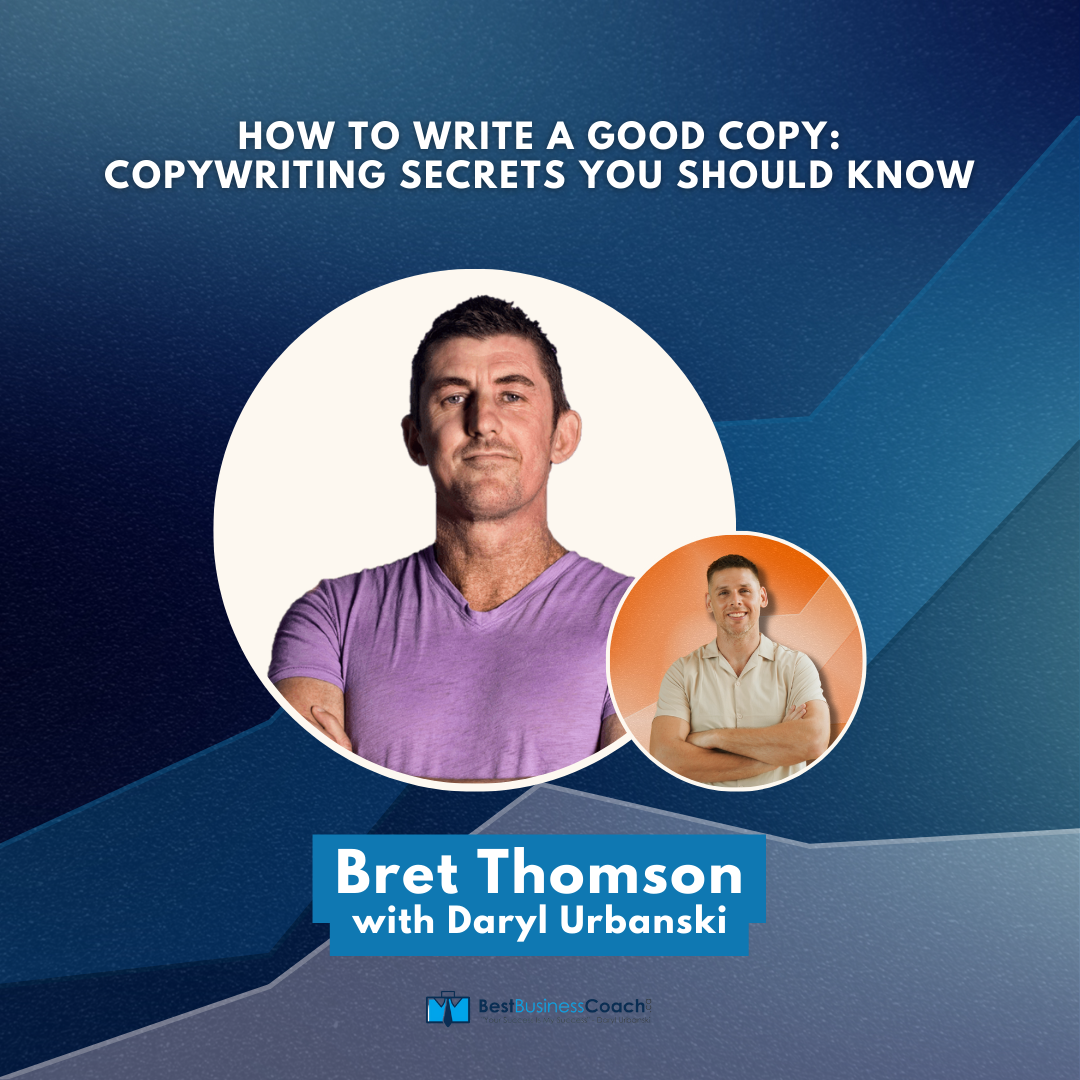In today’s podcast, we learn the fundamentals of copywriting from Bret Thomson, one of the most sought-after copywriters and conversion strategists in Australia. He talks about how he got into the copywriting space after avoiding reading and writing in school. Bret also shares five valuable things you must know to become a successful copywriter.
Copywriting is one of the most important skills any business owner must learn. When you know how to write a good copy, you can clearly and effectively communicate what you offer. You are then able to connect with your clients and build lasting relationships.
Give You ALL Our Best Interviews & Workbooks - FOR FREE?!
Yes! It's like having a business coach in your inbox.
Get all the Best Workbooks + Action Guides from our expert interviews delivered to you weekly.
(No fail).

*We will never rent, sell or pull any nonsense with your info. You may unsubscribe anytime.
We WILL send you useful + helpful tools, templates, info & cool stuff.
Here are three reasons why you should listen to the full episode:
- Understand how important copywriting is for any business owner.
- Discover how Bret went from being allergic to writing in school to excelling in copywriting.
- Learn Bret’s fundamental steps on how to write a good copy.
Resources
- Awaken the Giant Within: How to Take Immediate Control of Your Mental, Emotional, Physical and Financial Destiny by Anthony Robbins
- Work with Bret and his wife Lynika and automate your marketing at the Marketing Makeover HQ.
- For more Informative Interviews Click Here.
FREE "Mystery Gift"?
Let me stay in touch with you via email and as a thank you - get this FREE gift.. Something others paid over $1,000 for. (True story)

It outlines how I helped a client do over $1,000,000.00 in under 8 months.
With a single, automated online marketing strategy.
Still in use today.
*We will never rent, sell or pull any nonsense with your info. You may unsubscribe anytime.
We WILL send you useful + helpful tools, templates, info & cool stuff.
My mission is to help you live a long, happy, healthy, joyful & wealthy life.
Episode Highlights
How Bret Got Started
- In school, Bret didn’t like books and claimed he was allergic to reading and writing.
- 10 years after graduating, he became a full-time investor and made his social life his priority.
- He was blessed with twin boys, which completely changed his priorities in life. He started reading books and became a personal development machine.
- He then found himself in a network marketing business, where he developed the confidence to approach people, resilience to rejection, and the ability to sell things.
- After working at a nuts and bolts company for 15 years, he decided to resign and start his own business.
Entering the Copywriting Space
- After talking to some of the best marketers in Australia, Bret realized that his business model was bad.
- At first, he didn’t believe them, but he ended up listening to them after losing all his money.
- He heard about copywriting at an event and thought it was the last thing he wanted to do. He later realized that copywriting was simply salesmanship in print.
- Since then, he studied up on how to write a good copy and started getting results.
- Soon, people were emailing him and asking him to write for them.
Do Your Research
- Research is key to know how to write a good copy. Bret spends 70-80% of his time researching and only 20% writing.
- You don’t have to be a wordsmith to know how to write a good copy. You simply have to understand the psychology of your clients.
- Talk to your clients to know what makes them tick.
- What the business owner thinks he knows about the market is generally completely different from reality.
- A campaign that might have worked a few years ago may not work today. Markets change and evolve, and so does people’s awareness.
Come Up with a Big Idea
- The second thing you should be good at is coming up with a big idea.
- Many people play it safe, but Bret prefers pushing things to the edge and going out of the box.
The Importance of Headlines
- Most people stay on a page for only three seconds. They look at the headline and decide if it’s worth their time.
- You could have the same ad with the same body and offer, but you will get different results with different headlines. One will outperform the other several times over.
- Writing email subjects is a good way to practice writing headlines.
- When you go through your emails, scan the subject lines and see if anything catches your attention.
- Motion beats meditation, so permit yourself to write lots of bad headlines. That’s how you get in the flow.
Writing in a Conversational Style
- People usually feel compelled to use big words to sound intelligent, but doing this just puts readers to sleep.
- The best way to learn how to write conversationally is to sell an idea to a person you feel comfortable with. Ask them to give feedback and deal with these on the spot.
- There are a certain number of boxes you have to tick in people’s minds to make a sale. If you miss one, they are not going to buy it.
- One objection missed is a sale missed. Tune in to discover how to write a good copy, one that ticks people’s boxes.
Keep Everything Short
- The more people read, the more they buy. Unfortunately, people don’t like reading nowadays.
- Bret usually makes his paragraphs only one sentence long, especially in emails, to ease people into it.
- He also tries to limit his sentences to seven words, excluding the short ones.
- When you write, make everything as short as possible—short words, short sentences, short paragraphs.
- Long and convoluted texts allow your readers to trip up and start to skim-read, breaking the flow.
Here’s A Quick Way To Seriously Grow Your Business:
Free eBook - Learn how to generate leads to make more money and achieve higher ROI for your time, energy and effort - I guarantee the contents of this book will teach you everything you need to generate better quality leads on demand for your business.
We promise to do our best to treat you with respect. Signing up here will get you a copy of our free ebook and some follow up emails. Unsubscribe at anytime.
How to Improve Readability
- Layout design is truly important.
- The worst thing that can happen when someone comes to your site is if they don’t know where to look. This causes instant sales friction.
- Take out the clutter.
- Ask yourself: what is the soul and the priority of my website? Make sure these dominate your web pages.
Long vs. Short Copy
- Always write to heavy users. They are fanatics but write to them as if they’re skeptics.
- Write copy in the same mindset as the one you’d have if you were in court fighting to keep your kids. Don’t leave anything out to get your case across.
- Instead of pleasing those who are never going to buy in the first place, write to the enthusiasts.
- In the sales process, you don’t want your readers to think. By writing longer copies, you avoid creating an opportunity for readers to stop and think about the negative things.
- It’s about knowing how to present everything in digestible, bite-sized pieces laid out in a format that is easy on the eyes and in a way that speaks to your audience.
5 Powerful Quotes from this Episode
“I learned very quickly that you can have one good idea on one side, but unless you know marketing, then it can just flop and you can lose a lot of money.”
“Good marketing can sell a nonexistent product, while bad marketing can’t give away free gold.”
“Copywriting is a skill that will pay for life, and it’s because it’s about just really articulating what it is you offer to people in simple language.”
“If you don’t know the conversation going on inside your customer’s head, you’re going to spend a lot of money to get a lot of data, but you need to know how to improve it.”
“To be a real business and grow in scale, you actually have to advertise.”
About Bret Thomson
Bret Thomson is a best-selling author, speaker, coach, and mentor to thousands. He is one of Australia’s highest-paid and most in-demand copywriters and sales conversion strategists. He has consistently created successful multimillion-dollar marketing campaigns for his clients. He is responsible for the marketing behind bringing Sir Richard Branson out to Australia. He is also the secret weapon behind some of the country’s largest and most profitable direct response marketing campaigns.
Bret is an explosive and entertaining stage presenter. He is the creator of one of Australia’s most popular copywriting products called The 7 Hour Sales Letter. This workbook has taught thousands of people how to write a good copy.
Enjoyed This Podcast?
Jon shares some business development tips and tricks to help aspiring entrepreneurs hit the ground running. If you enjoyed the podcast, be sure to subscribe and share it with your friends!
Post a review and share it! If you enjoyed tuning in, then leave us a review. You can also share this with your family and friends.
For episode updates, visit our website.

